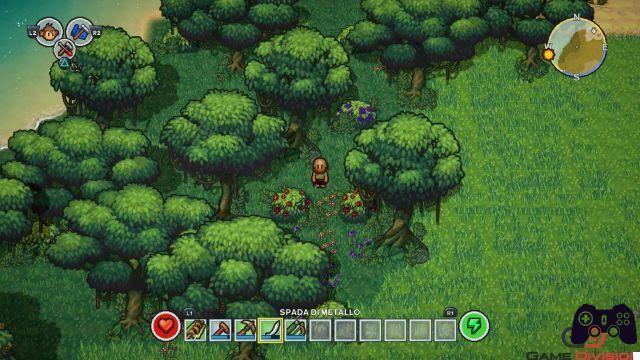Frank Herbert's Dune series has been reread in many ways, in almost every medium possible. After all, it is one of the cornerstones of world science fiction, so it is not surprising that many feel inspired by it and, given that it continues to sell, many others try to exploit its success. That is to say, there has never been a shortage of video games based on Dune, including strategy games, adventure games, action games, etc. There are currently several projects related to the series in production, also thanks to the excellent reception of Denis Villeneuve's recent film, which is about to receive a sequel.
La Dune: Spice Wars review Then I will try to explain whether or not it is worth fighting for the spice on Arrakis again and if Funcom is making good use of the license acquired a few years ago.
His Arrakis
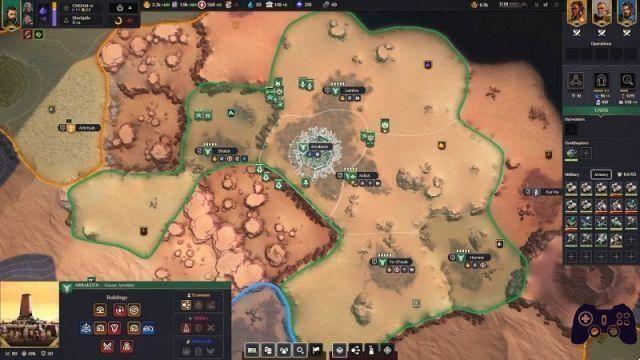
Looking for a canonical definition, Dune: Spice Wars is a strategic in real time with 4X elements developed by the specialists at Shiro Games, to whom we owe the beautiful Northgard, that little gem of Wartales and the two Evolands, just to give a complete overview of their main productions. The experience acquired over the years by the company is immediately evident. The game has been in early access for some time, with players being able to try out the Battle For Arrakis mode for months, that is, the classic sandbox section that can be configured in various ways, in which you can choose a faction among those available: Atreides. , Harkonnen, Corrino, Ecaz, Fremen and Smugglers (Ecaz... but who wanted the Ecaz? Herbert's son must have asked for them since the characterization of him is largely his own creation). Here you have to be able to prevail over others, expanding from territory to territory, accumulating stronger and stronger troops and gathering resources, all while avoiding angering that usurer emperor who demands taxes from him on a regular basis.
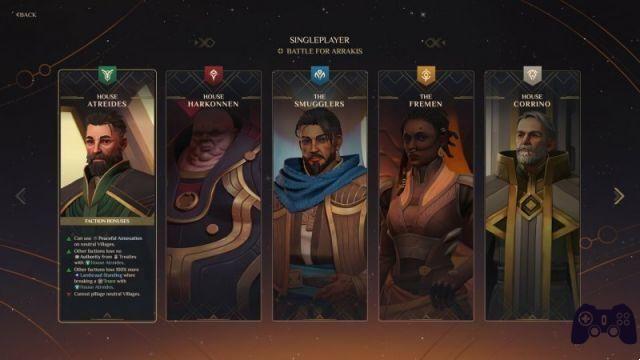
Each faction It has its strengths and weaknesses, which must be taken into account when planning expansion. For example, the Harkonnen are more aggressive and therefore have an advantage militarily, while the Atreides can engage more effectively with local communities. The Fremen are weaker militarily, but have advantages for being indigenous to Arrakis, while smugglers accumulate wealth faster but are considered scum by everyone else.
Gameplay
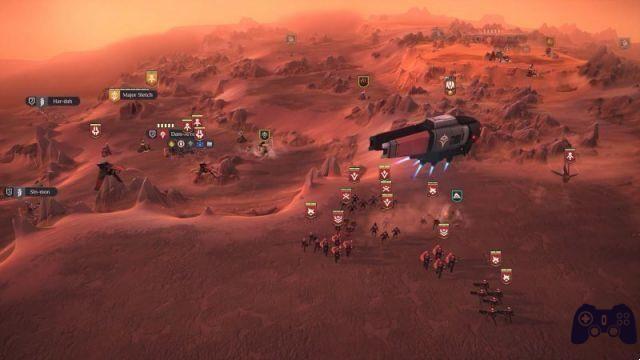
It must be said that this part of the game works really well. We are not looking at the deepest 4X on the market, definitely not, but one created around a handful of lightweight systems, explained by a series of very quick tutorials, which give rise to more agile game dynamics than those of other exponents of the genre. . . The player must first reveal the resources in the territories adjacent to the initial one (maps are generated procedurally) using ornithopters, then he must begin to conquer the villages, which he will have to defend by training the local militia and which he will have to equip with buildings with specific functions several, such as water collectors, a very precious resource on a desert planet like Arrakis, recruitment buildings to have more manpower, air bases to speed up the transportation of troops, etc. In addition to the initial structures, others will be unlocked through scientific research, divided into four areas of specialization, each with its own upgrade tree.
Unlike other 4X, there is no preferential order of construction, also because each village can accommodate very few buildings (the number of buildables can be increased by investing in them), but you must follow the progress of the game. That is, each time evaluating which resources are most necessary at a given time and in a given area of the map. Only if there are specific raw materials in the territories, it is always advisable to build the connected collection buildings first, because they undoubtedly yield more. In particular, this applies to the invaluable spice, so we decided to wreak death and destruction on Arrakis, confronting the other houses and the locals. The spice has a specific mechanic, between the construction of harvesters for harvesting and the use of ornithopters to control the activity itself, in order to prevent the vehicles from being devoured by a passing sandworm (they are attracted to the noise). It will not be surprising to know that the territories with spice deposits will be the most contested.
Wars and alliances

As we said, everything works very well: in short, we find ourselves with a handful of controlled territories, which project us towards the middle game, where the weight of the decisions made begins to be felt more and the confrontations with the other factions. Not only of a military type, they are increasingly common. At that moment the diplomatic system, with the possibility of voting on issues that concern all houses and making agreements and alliances, and the economic system was understood, not only based on production from Arrakis, but also on the purchase of shares of a stock galactic. exchange, linked to the collection of the spice. Perhaps we have also learned how to use agents effectively, which can be used for different purposes, such as stealing information from other houses or creating consensus among locals. It must be said that Dune: Spice Wars is really effective in the introduction phase to its systems, which are presented with a certain delicacy, so that the player learns and becomes familiar with them naturally.
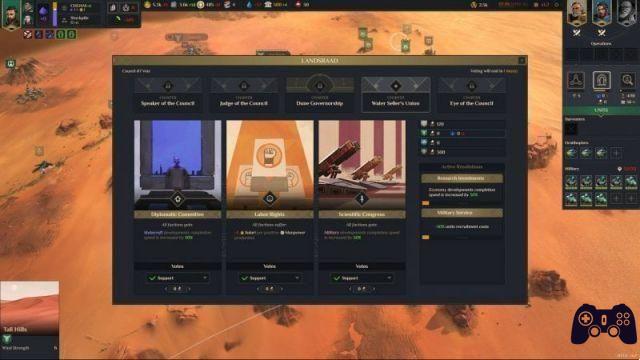
I fight They happen completely automatically: you select troops and send them against the chosen target. The player has no direct control: he can only try to escape if things get bad or he can send reinforcements if he has other units available. If you want, you can build support buildings, such as barracks or missile batteries, options that must be made in advance and not during battles, but in general you are not asked to do much more than play a supervisory role, which does not involve This is bad since you still have to handle many different situations, often at the same time (the action can be paused, don't worry). As for recruitable units, there are a handful for each faction and they are based on "rock, paper, scissors" logic. There aren't many, but they serve their purpose, and since Dune: Spice Wars' focus isn't on combat, adding more would have risked overloading the experience.
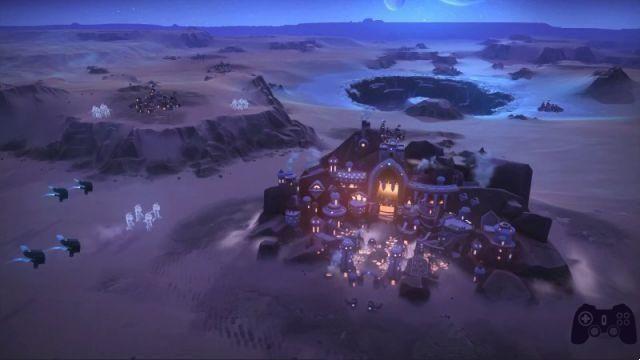
So far so good, you could say quoting "Hate" by Mathieu Kassovitz. The games flow fluidly, the gameplay manages to involve you and little by little you manage to unlock advanced content, discovering the air units and all the measures adopted by Shiro Games to improve the game, update after update. If desired, the game could also have been closed here, in the sense that what is there is enough to satisfy a Dune and strategy enthusiast, also taking into account the not very high price of the set. Unfortunately, a campaign was also promised that arrived with the game's pre-release update.
Problems with the campaign.

As you may have guessed, the single player campaign It's quite disappointing. It is essentially made up of a series of missions that can be selected on a map of a region north of Arrakis, which must be completed to gain full control of the territory. On paper each mission has different objectives, which would suggest a minimum of variety, but the structure of the game fails to open up to the point of supporting such a statement and the missions end up playing in a very similar way to each other, with the player having only You have to pay attention to the specific requests made, such as the conquest of a certain number of territories, the survival of certain units, etc. Honestly, we would have expected something more. At least a few tricks that attempted to distort the basic formula in some way, putting increasingly deeper stakes in front of the player to increase the challenge and create unique situations. Rather, it's a simple attempt to narrativize the basic gameplay, done through videos and some uninteresting objectives.

Of course, it was difficult to organize something more complex, considering that here too the maps are procedurally generated. Perhaps it would have been convenient to create fixed ones, to be able to plan unique situations and events. The very possibility of selecting one of the four houses does not change the situation much, considering that they all play exactly as in the Battle For Arrakis mode. The initial plan was probably to create something more complex, but sales of the early access version had to reduce the scale of the project, forcing us to create an experience that ends up adding very little to the standard mode. The same goes for Duel Mode, which is essentially the basic game played 1v1, with the ability to also select Fremen and Smugglers. In short, the excellent work done in the main core of the game, indisputably, is not reflected in all the modes, which in some cases simply seem superfluous as they are not supported by specific systems that make them emerge.
Conclusions
Tested version PC with Windows digital delivery Steam Price 29,99 € Holygamerz.com 7.5 Readers (11) 7.3 your voteDune: Spice Wars is an excellent strategy game, unfortunately plagued by some lackluster modes, particularly the single-player campaign, which failed to deliver on all the promises made during Early Access. In any case, the basic formula works very well and alone can be worth the entire package, but the regret remains for a hasty garnish, probably for budget reasons, that would have deserved more care. Overall, therefore, we are faced with a good title, but one that could have been decidedly better.
PRO
- A light but deep 4X
- Basic mode is really good.
AGAINST
- The contour modes are not particularly refined.
- The Ekaz





